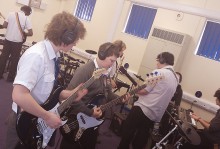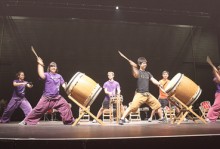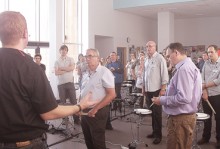As we launch our new website and sally forth into a new year. The time has come, I’m told, to create a blog. But who would want to read it is my immediate fear! And how would we fill it? I’m told by people within our organisation that we offer a unique perspective. We meet and work with many different educators in the course of our business, all with a story to tell. We are also teachers who now work outside the classroom, supporting our colleagues within and connecting them to manufacturers and artists, the professional music business some might say. So, here is our our Blog. Over the course of the coming months and years we will provide, reviews of products or services that may appeal to you, case studies and feedback from teachers trying new approaches. We will also post articles from tutors working with JamPod™, JamClassHD and ClassTaiko. But to start, in 2011 I was asked to write a piece with no brief. This came before the advent of Music Hubs and a National Music Plan. Its been tremendously interesting to me to revisit how I felt then…..
I have had the great privilege of writing and researching many articles over the last few years. It is something I never envisaged doing, but something I enjoy immensely. Receiving a brief, researching the subject, collecting information and creating the narrative, I love every aspect. But what if there was no brief? Its like being asked to improvise for the first time, fear, desperation and panic set in……Until you consider your article as a composition.
You pick your blank piece of manuscript, I still do as a matter of fact (I find it conjures the creative juices much better than a blank screen), which way will your new creation go? Major or minor? Fugue or Cantata? Rock or Jazz? So many options. But can you remember the very first piece of music you created? The first blank sheet you filled with what I believe is a connection to your very soul? I had so much I wanted to say, so many places I wanted to go. This is where I find myself in this article, as my wife said on hearing the lack of brief, ‘’you, without boundaries……there may be trouble ahead!’’
When you consider where we are nationally, not just in music but across the country, there may be trouble ahead. We have lived through an era of opulence on an unprecedented scale and sadly for us someone has to pick up the tab. The problem is that someone has run out of money. If we consider where their money was spent it has been a good ride. Millions spent on new instruments and ideas in the Wider Opportunities program, but as I recall so vividly in 2004, when I was charged to write a scheme of learning for a range of percussion options, there were no boundaries or goals set. This was a plan which looked great on paper but was not thought through.
Wider Opportunities
Transition from Wider Opportunities was poor if not none existent in most places until it was too late; this was a golden opportunity to spawn an era of unprecedented musicality in our society. The programs were giving young people a wonderful experience and in many places were giving a non- musical primary teacher much needed confidence to ensure progression. But in too many places the Wider Opportunities session was funded as PPA cover. Was any thought given to the infrastructure needed to support the potential up take after the sessions completed? I do not think it was. Music Services were not given the support nationally and locally to maximise this opportunity for their schools and students. It was only as the project reached its later stages that some direction was instilled.
Imagine if the program had been thought through properly from day one. The first consideration being how best to engage young learners at source. If we had all pitched the right project at the right year group at the right time, the effects could have been outstanding. In many places this began to happen, three year programs were launched starting with percussion to in still rhythm and to engage. This was followed up by progression into a simple melodic program, ukulele, pocket trumpet, chalumeau etc. Finally in the third year students were given the opportunity to try strings, woodwind or brass. This was a program that gave every child the knowledge to make an informed decision, whether music was for them or not. In many places this has happened, but it took too long.
When you consider the return on investment was this good value? I would argue that a huge proportion of primary & secondary schools would say it was not. I am and always will be an advocate of the Wider Opportunities approach. I have experienced programs that have transformed schools and the learners within them. Confidence gained, friendships made, new talents discovered with all the knock on effects to other areas of school life. But, if you consider where we should be, when you consider what a coherent plan would have delivered, it is very difficult to argue we made the most of someone’s money.
How did we get to this point? If you take a problem, and you charge hundreds of different people with coming up with a solution, what do we get? With Wider Opportunities it was absolutely no surprise that we got hundreds, thousands of different solutions, all with benefits and all leading to different outcomes. This model led to confusion at every level and did not engage fully the pupils who experienced the programs or the schools who bought into them.
To make matters worse, how was Wider Opportunities funded? Every area seemed to have a different model for disseminating the supporting funds. In many cases decisions were being taken about the direction of music within a geographical area, by people who had no interest or knowledge of the subject at hand. Instead of being a bright new dawn for music in the UK, Wider Opportunities created an immense amount of unnecessary work for practitioners who just wanted to get on with the job they signed up to do, teach!
It was therefore not a surprise to read in Darren Henley’s ‘Review in Music Education’ published earlier this year, “I was told time and time again that Music Education in England was ‘good in places, but distinctly patchy’”. Henley follows on with, “Music Education has benefitted from major government investment over the past five years. It is clear from many of the submissions made to this Review that this method of funding has not resulted in a uniformity of provision across the country’’. Personally I can’t argue with either of those statements.
Now I am the first to take responsibility for mistakes, and I delivered Wider Opportunities from its national launch to 2010, and I can tell you that I always did my best to deliver a wonderful experience for the pupils involved as did the majority of my colleagues across the UK. But as we have discussed in this article at length, given the total lack of a clear national plan, Wider Opportunities was doomed from its conception. No matter how much of someone’s money you throw at a problem, without direction and drive from the top to the bottom of a project, you are throwing your money away. So I don’t know about you, but I feel rather aggrieved that the shortcomings of the project are now used to criticise future investment in Music Education.
Secondary Music Making
At secondary level, in so many areas of the UK, the quality of pupils transitioning from primary school is patchy to say the least. So many heads of music have seen a noticeable decrease in the ability of students moving up and are struggling to keep their ensembles alive. (It is interesting looking back on this in 2013, I was in a secondary school last week in the North West of England and exactly the same issues were relayed to me. Students start school thinking they dislike music thanks to their experiences with Wider Opportunities) Echoing Henley’s patchy provision comments, as you travel from one town to another the results you see can take you from the sublime to the ridiculous. One school will have a vibrant music department, regular school performances, a vast array of ensembles for students to engage with etc. Another will have nothing, no music beyond year nine. In virtually every success story, the school will start with a head teacher who understands the value of music and supports their department’s growth.
Generating a National Plan
If ever there was a need for a national plan, to ensure everyone receives at least a similar quality of provision, what we see today in UK Music Education clearly demonstrates that need. Many would argue why waste the time? What does music enable when it comes to putting food on the table and paying off the national deficit? I would argue, as I am sure all of you would, that is missing the point.
Music is the very first thing we engage with as human beings. As children we pick up drums and play them without a care in the world, we sing at the top of our voices, we try new things and not care how we sound or how we look. Music allows our souls to find a voice and to show themselves. The connection evident with other human beings when playing in a band, orchestra or singing in a choir is unique. It demonstrates in an unspoken way how working together, as part of a team can help us take on life’s challenges and win.
Music enriches our lives in every way and without it we lose part of what makes us human. A few times in my teaching life I have helped an adult reconnect with that feeling. I have watched as years of barriers built up in life, fear of failure, concerns of losing face and being embarrassed etc., have been stripped away to reveal what was always there. Those are my lifelong teaching memories; they make me cherish the job we do. Without sounding dramatic, for the good of all our futures, we need a plan.
We need a plan with commitment to implement from all key stakeholders which puts the student at the heart of that discussion. Once that national plan has been agreed, we need to see action, from primary, secondary to further education and beyond. We will need to discuss this plan of course, but we cannot get bogged down as we have done in the past, every decision taking numerous consultations to result in anything of importance being decided. How likely do I think that a coherent plan will be put into place? Looking at the successes of the last 40 years I am not filled with confidence. There may be trouble ahead….or will there?
The direction of our musical future….
Something is happening in our classrooms. Over the last 12 months I have seen a shift in so many music tutors’ actions. People are starting to make positive moves, new ideas forming and real differences being made. The absence of funding and the potential fires of the Ebacc seem to be honing minds. The focus on this shift seems to be engagement and the realisation that we have been missing a trick.
If we took a poll of the most popular music and musical instruments, I think we all know what the response would be. So why is it that until Simon Pitt and Norton York formed Rockschool only 20 years ago, it was impossible to take an accredited examination in the instruments that engage the many? In education and its changes, 20 years ago is the equivalent of last week. So whilst Rockschool have gone from strength to strength, Trinity Guildhall have just followed suit and with the Registry of Guitar Tutors bringing out a new Rock Guitar approach, you would be crazy not to expect something from ABRSM. (2013 – There have been plans, I saw the drum kit syllabus which looked tremendous, but still nothing)
I believe this change is instrumental to our new national plan; it is an en masse acceptance that to survive we have to change. If we want to engage new musicians in formalized learning, we should use the music which these students listen to and the musicians they aspire to be.
Many of you will be asking why we need to do this. There are many private organisations out there engaging this demographic of musician with great success, the classroom supported by the music service should focus on instrumentation that needs protecting, wind bands, orchestras, chamber choirs etc. I agree with you wholeheartedly, but to do this we need to identify the students of tomorrow, today. Many of our wind bands, orchestras and chamber choirs etc. are dying because we are not successfully identifying the players of tomorrow.
By providing for the many we will engage everyone who wants to take part in music making. How can we earn the trust and respect of new musicians if we never have the opportunity? We have been missing that opportunity, for years. Surely it is not our place to dictate to students how they should engage in formal music making; it is our job to understand how they will, and to provide that for them. We may see a change in our ensembles, but if that secures the future of a groups music making it is surely a price worth paying. But that could and should be a last resort. We work with many educators who have seen an increased uptake in less popular instruments when those instruments are recruited for in a way that engages and inspires.
We must focus the delivery of our curriculum around what it takes to be a musician today. No one doubts the importance of the lessons that need learning from every era and genre of music, but we must start our journey in the here and now. Once we have engaged our students, they will follow wherever we lead them, from rock to baroque, Beethoven to Zawinul. So long as the path is clear from entry to exit of our musical learning, the potential for this plan is immense.
We must allow our students a clear pathway in all elements of instrumental playing. They may perceive that they want to play guitar, but in the process of engaging with our program, they will be exposed to all instrumentation in an environment the student can associate with. This will truly widen opportunities for all our musicians. In short our music departments must be all inclusive.
What could the future hold?
Imagine a school, supported by its music service, which engaged all its musicians? A completely engaged demographic of students all working together for the betterment of themselves and music as a whole. Ensembles geared up to service the instrumentation that exists and to deliver the experience that young musicians need to prepare them for modern music making. This increased engagement naturally leads to a dramatic increase in income. With regret the days of free instrumental lessons for all are history. Parents expect to pay something, and actually with that payment comes a greater interest in their young musician’s progress. This increased income will help us support those instruments and ensembles which need a little help to keep them alive.
This sounds like the impossible dream, but it is happening already. In pockets all over the UK, tutors are bravely putting their head above the parapet, demanding more and getting it. These new projects are not only engaging school pupils, but their communities as a whole. They are bringing primary, secondary, further education and adult learning together, and they are beginning to reap wonderful rewards. This is the clearest possible educational path and the antithesis of Henley’s ‘patchy provision’.
Technologies now exist to help us achieve what was previously impossible:
- Silent music classrooms allowing all to engage and learn at their own pace
- These environments also allowing the dearth of bands within a school to rehearse andrecord in one space, with no noise pollution
- Online resources allowing students to continually engage in their learning, in and out of theclassroom
- Music notation and production software that doesn’t break the bank and that is enjoyable to use. By combining these technologies with sound educational and business practices, these new projects are potentially shaping the future or music learning. An all-inclusive learning which enables everyone to achieve there potential.
Conclusion
There may be trouble ahead. We are in the clutches of an era of austerity with funding to support the arts little or non-existent. But as we have discussed, when the money was flowing massive opportunities were missed.
So now is the time to stand up and be counted, to make your voice heard, but my challenge to you is to make your voice heard through actions. We have spent too much time talking; we have missed too many students as we endeavoured to get things just right. Stand up for music in your communities through well thought through practices. Focus your activities on engaging the many and income will follow. Invest that money within your departments with an eye on sound business practices e.g. ensure your investment will reap sound educational or financial benefits that will further enhance your department and delivery.
We all know the benefits of engaging in music making, we must champion them all, now. Many of our colleagues are doing just that, no longer accepting the boundaries previously holding them back and achieving so much more for their communities. There may be trouble ahead, but where there are music tutors demanding more and delivering, students of all ages desperate to engage and progress, let’s face the music and dance.








